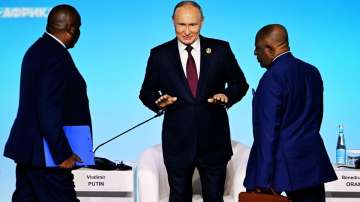In a major development, Russian President Vladimir Putin, who has been facing immense criticism for suspending the Black Sea grain deal, on Thursday broke the silence and said that the initiative had lifted illegitimate obstacles to Russian exports of grain and fertilizer to global markets, none of Russia’s conditions was ever fulfilled. According to the Russian leader, although the Istanbul agreements were intended to ensure food security for the neediest countries, the bulk of Ukraine’s grain actually went to wealthy Western countries.
"Among other things, Russia agreed to participate in the so-called deal, taking into account the commitments it contained that illegitimate obstacles to the export of our grain and fertilizers to global markets would be removed," state news agency TASS quoted him as saying. "In actual fact, nothing of what we discussed or what we were promised ever materialized," Putin lamented. "None of the conditions providing for the lifting of sanctions on Russian grain and fertilizer exports to global markets were implemented, not a single one of them," he emphasized.
What is the Russia-Ukraine grain deal?
It is worth mentioning Russia and Ukraine account for major wheat exports to the world, especially African nations. It exports shipments through the Black Sea. However, following the relentless war, Moscow blocked the route, resulting in spiralling costs of wheat, cereals and other agricultural products.
This also showcased the worst impact on African nations. In fact, several countries were on the verge of starvation. In April 2022, the Secretary-General met with Russian President Vladimir Putin and with Ukrainian President Volodymyr Zelenskyy to propose the plan.
Subsequently, on July 27 last year, the United Nations and Turkey brokered a deal in Istanbul which was dubbed a "grain deal". However, on July 17, Moscow terminated the crucial deal and said it would not resume unless and until all the demands pertaining to Russian exports were met. This triggered panic in the entire world, excluding India, as the latter has a surplus amount of wheat and rice in stock. However, African nations, which are entirely dependent on imports, were stuck in limbo.
Impact: Wheat prices increase sharply
According to a UN report, the Black Sea Grain Initiative has reportedly allowed the export of 36.2 million tons of food from Ukraine to the world, especially African nations. In fact, Zelenskyy has often dubbed the grain export as the ‘breadbasket of the world’. Besides, more than 79 countries are heavily dependent on grain export amid the fact climate change wreaks havoc across continents and destroys crops.
According to multiple media reports, wheat prices took a sharp jump of 11 per cent after the development hit the headlines across the world. Before the war, Russia and Ukraine together accounted for 25% of the global grain supply.
“You will have a new spike for sure (if the deal isn’t renewed). The duration of that spike will depend a lot on how markets will respond," news agency Associated Press had quoted UN Food and Agriculture Organisation chief economist Maximo Torero as saying.
Putin vows to send free grains to Africa
Earlier today, vowed to send free grain supplies to six African countries-- nearly ten days after he suspended the Black Sea grain deal. According to the reports, the Russian President pledged to send nearly 50,000 tonnes of grain to at least six African countries-- amid the fact these countries were worst affected by the recent action taken by Moscow.
"We will ensure free supplies of 25,000 to 50,000 tonnes of grain to Burkina Faso, Zimbabwe, Mali, Somalia, Central African Republic and Eritrea," said Putin as he opened a Russia-Africa summit in St. Petersburg.
Also Read: Russia may take U-turn on Ukraine grain deal: Putin says would resume export if Moscow's demands 'fully' met
Latest World News
